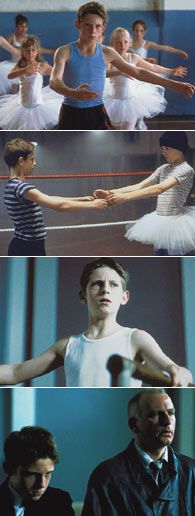BILLY ELLIOT (2000)
Directed by Stephen DALDRY
Starring Jamie BELL, Julie WALTERS, Gary LEWIS

Like his fellow English theater director Sam Mendes (of the "American Beauty" fame), Daldry, in his directorial debut, has transferred his talents from stage to screen deftly with spectacular success.
Set in a working-class English town (Everington Country, Durham) convulsed by the bitter miners' strike of 1984 when the then Thatcher government ordered the closing of uneconomic collieries, "Billy Elliot" is about an 11-year-old boy, Billy Elliot, who wants to be a ballet dancer but is opposed by his widowed father (Gary Lewis) and militant union leader brother who initially both espouse rigid gender definitions (by sending him to boxing lessons) but turn supportive in the end.
Billy's father equates male ballet dancers with homosexuality, though the film does its best to remain ambivalent about Billy's actual sexual orientation. But more on that later. How his father, a supporter of the union's strike, not only begins to understand his son's talent and passion, but actually becomes a "scab" (union members who cave in to strike) to get money for him to attend an important audition, is make-believe at best. The other flaw may be that Billy's sudden attraction to ballet comes out of the blue.
The film more or less follows the tried-and-tested formula of hard work and total devotion to a cause - virtues that allow the protagonist to accomplish almost anything he or she wants, in spite of and in the face of griming social and economic emsculation.
The difference with "Billy Elliot" is that Billy's personal struggle for fulfillment is constantly intercut, both narratively and visually, with events surrounding the strike, and the climax of his achievement is harshly, wonderfully undercut by the men's growing bitterness. Adding energy is a soundtrack that mixes rousing anthems of the period by the Jam and the Clash with several early '70s T. Rex songs, which match sexually ambiguous singer Marc Bolan's insinuating delivery with muscular, fuzzy guitars and bubble-gum catchiness.
The film is refreshing too in its treatment of the potentially explosive interplay of labour unrest and class war, which has shown that the arena of class and politics is as much the living room as the mine in the excellently staged blow-up between Billy's family and his dance instructor Mrs. Wilkinson, plays by Oscar nominee (for Best Supporting Actress) Julie Walters, who delivers a gritty and colourful performance.
Newcomer Jamie Bell who plays Billy is the real draw of the film. Bell does a convincing job of making Billy's unharnessed impulses natural. His dances on his town's cobblestone streets, like a half-pint Gene Kelly, are as exuberant as they are wild, and he throws himself into the dance sequences with blissful abandon, for which he bags a BAFTA (British Academy of Film and Television Arts) award for Best Performance by an Actor in a role, the UK's equivalent of the Oscars.
However, the short shrift given to Billy's ambiguously gay best friend Michael (played by an androgynous looking Stuart Wells) gives the film a shallowness that the energetic performance of Jamie Bell can't overcome. Billy learns to stop thinking of ballet as an occupation for "pooftahs" yet Michael comes on to him once he starts dancing. Billy shows no particular grace until Michael espies a tutu. That Billy is shown to bond with Michael ultimately is a forced demonstration of the film's hero's open-mindedness that's all too manipulative.
But the strength of Bell's tempestuous performance carries the picture through any and all manipulative moments. This kid is such a wonder that even if "Billy Elliot" wasn't a total delight, it would still be worth seeing just to watch him.











 列印版本
列印版本









